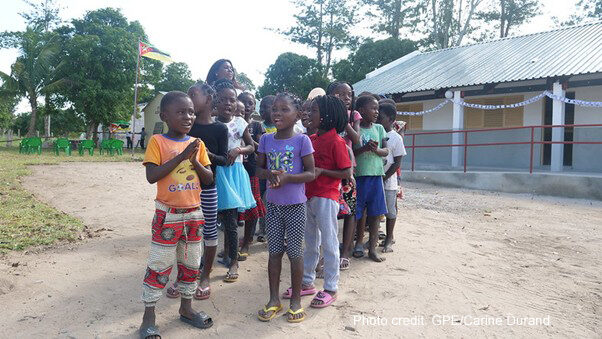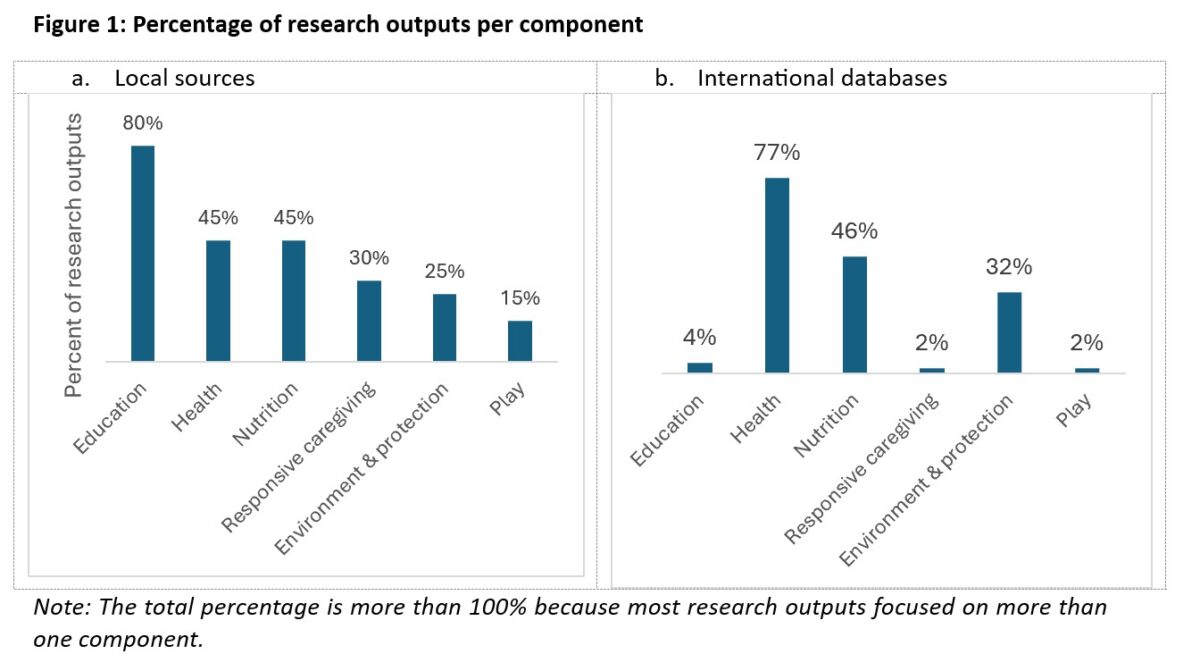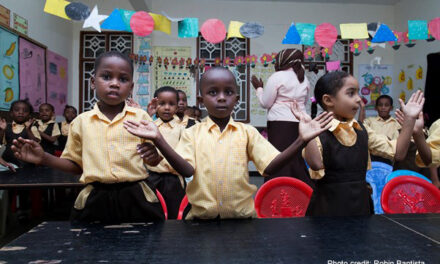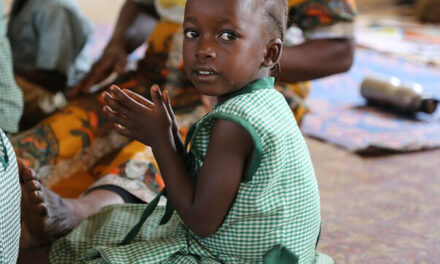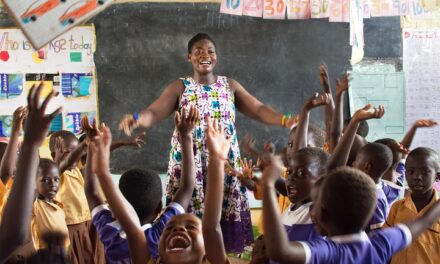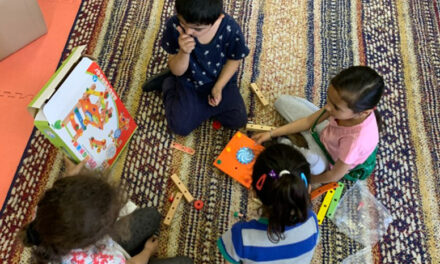This blog was written by Stephen Acquah, Education Sub Saharan Africa, and Rui da Silva, Centre for African Studies, University of Porto
Introduction
Early Childhood Development (ECD) is a critical phase in a child’s life, forming the foundation for future health, education and overall wellbeing. In Mozambique, where children under age 10 make up a significant proportion of the population, investing in ECD is more than a developmental imperative; it is a national priority. Yet, when it comes to local research on ECD, the picture is less encouraging.
A recent project led by Education Sub Saharan Africa (ESSA) and the Research for Equitable Access and Learning (REAL) Centre at the University of Cambridge, with funding from the Conrad N. Hilton Foundation, set out to first: map existing ECD research led by Mozambican scholars based in local institutions, and second: raise the profile of the researchers involved (i.e., through advocacy, capacity building, direct research grants, conferences/workshop opportunities, etc.) to produce context-relevant studies to direct policy and practice. This blog discusses the mapping, highlighting what we found, what is missing, and ways to expand ECD research in Mozambique.
Why ECD research matters in Mozambique
Mozambique’s population is young, with 34 percent of the population comprising children aged 0–9 years. The country’s 2018 Education Law identifies pre-school education as a crucial part of the national education system. Despite this, many Mozambican children, particularly those in rural areas, face significant challenges in accessing quality early education. Over a third of children under five are left alone or with another child for more than an hour weekly.
The country’s Strategic Plan for Education 2020-2029 prioritises equitable access to pre-schools, implementing a national pre-school curriculum, and strengthening pre-school governance. Achieving these goals, however, requires evidence generation through robust context-specific research to guide decision-making.
What the mapping revealed
Research output trends
A total of 20 ECD research outputs (19 in Portuguese and 1 in English) authored between the years 2010 and 2022 by at least one Mozambican affiliated with an institution based in Mozambique were identified through local sources (see a brief note at the bottom of this blog for additional details of the study methodology). Prior to 2020, there were only 5 studies. The highest number of studies (8) was recorded for 2022. Three of every 4 studies were reports, while the others were book chapters (3) and PhD theses (2). No journal article was recorded from the local searches. While the number of eligible studies was very low, our search in international databases (i.e., Scopus and Web of Science) identified 57 English language ECD journal publications from Mozambique between 2020 and 2022. This suggests that journal publications were more likely to be in international journals.
What was the focus of the identified studies?
The 20 studies identified through local searches were more likely to focus on education, which was likely to be in part due to our networks in identifying researchers and research. Play was the least studied (Figure 1a). Most studies addressed multiple components of ECD (also including health, nutrition, responsive caregiving, and environment and protection) highlighting the interlinked nature of ECD.
The pattern is different for publications identified through searches of international databases, where 77% of the studies focused on health, while only 4% were on education, and just 2% on play (Figure 1b).
Geographical, inclusivity and socio-economic gaps
None of the studies identified through local searches explicitly addressed key inclusivity indicators such as gender, disability, ethnicity, religion or socio-economic status, despite the country’s commitment to global and regional equity frameworks like the Sustainable Development Goals (SDGs), African Union Agenda 2063, and the Continental Education Strategy for Africa (CESA 2026-2035). Lack of attention to these indicators suggests a critical gap in understanding diverse challenges faced by children in their formative years. More of the studies identified through international database searches addressed at least one inclusivity indicator (34 of the 57 articles), with socio-economic status being the most frequently explored (25).
While most of the studies from local sources focused on urban areas, there was a dearth of research on rural areas, which host most of Mozambique’s population. By contrast, studies sourced from international databases demonstrated a more balanced geographic focus: 8 studies focused on urban areas, 7 on rural areas, and 39 covered both settings, with only 3 studies not indicating a setting.
Funding
Of the 20 studies reviewed, 12 reported receiving support from local organisations, while the remaining studies either had no reported funding or were not funded at all. In addition, 40 out of the 57 publications sourced from international databases explicitly indicated funding support. Almost all the studies were funded by international organisations. Funding from philanthropic foundations was also common (22), with just 4 from governments, and only 1 from a local organisation.
Researchers’ gender and collaboration
More female researchers (66%) were involved in the production of the 20 studies identified through local sources. However, they were less represented in the 57 studies identified through international databases, accounting for only 30%. This shows that male authorship is more apparent in Mozambique ECD research, and particularly in outputs that are commonly associated with opportunities for promotion and professional development as well as global impact.
In terms of research collaboration, 12 studies from local sources involved collaboration among researchers within Mozambique. However, there was no evidence of collaboration either with researchers from other sub-Saharan African (SSA) countries or from outside the region. By comparison, most publications from international databases reflected broader collaborative efforts. Collaboration with researchers outside SSA was the most common, featuring in 51 studies. Collaborations within SSA and within Mozambique were also present in some cases, recorded in 9 and 5 studies respectively.
Recommendations
This analysis reveals significant opportunities for advancing local ECD research in Mozambique:
- Address under-researched areas: Prioritise studies in education, play, responsive caregiving and environment and protection. Additionally, integrate inequality analyses into ECD research projects, where appropriate.
- Increase investment in ECD research: More funding is needed to support ECD research, particularly on rural and under-represented areas. Investments should also focus on building research infrastructure and capacity, enabling local researchers to take ownership of the research process and shape the national ECD agenda.
- Foster collaboration: Use funding mechanisms to foster South-South research collaborations. Also, there is a need for stronger linkages between researchers and policymakers. Establishing a national ECD research agenda aligned with Mozambique’s development goals can ensure that research is not only produced but used to inform decisions and improve children’s lives.
- Support female researchers: Offer targeted support to female researchers to ensure sustainable and equitable production of ECD research, in particular for publishing in internationally-recognised journals. This could include organising networking events, conferences, and workshops specifically designed to spotlight female researchers.
The future of Mozambique’s children depends not only on delivering early childhood services but also on generating and using evidence that reflects the country’s unique contexts to deliver quality childcare services. By investing in local researchers, expanding access to publishing, and prioritising inclusive research, the country can lay the groundwork for a more equitable and informed ECD system.
Box 1: Brief note on the methodology of this study
|
The Movimento de Educação Para Todos de Moçambique (MEPT) undertook the mapping of the 20 studies, in collaboration with the ECD Network, alongside the faculties of education at Eduardo Mondlane University and the Pedagogic University of Maputo. The mapping process followed a structured ECD search protocol outlined by Williams, Iddrisu and Rose (2024). The search was conducted in Mozambique institutional repositories (MEPT database of organisations and consultants specialising in ECD) and national journals. Additionally, an online survey was conducted to solicit research. The international databases search was conducted by Iddrisu et al. (2024) following the search protocol by Idrisu et al. (2024). We adapted the Nurturing Care Framework (WHO, 2018) as the starting point for identifying and categorising sub-groups (components) of ECD. We focused on only studies that address one or more components of ECD for children aged eight years and below. This was to ensure we captured early childhood education along with other components of early childhood development. In most countries, the pre-primary education age range is 4-6 years but could extend to age 8 (particularly where children are over age). We focused on studies authored between the years 2010 and 2022 by at least one Mozambican affiliated with an institution based in Mozambique. A thorough screening process was undertaken using the titles and abstracts of all the studies. This was followed by full-text screening and cataloguing of relevant information. |

